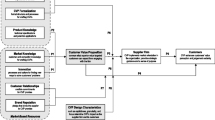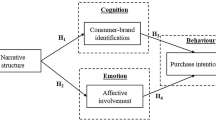Abstract
Businesses increasingly consider corporate reputation as a valuable asset that has a positive impact on purchase intention. Concurrently, corporate social responsibility (CSR) issues have received growing attention and the importance of CSR has been increasingly emphasized. Claims have been made that both CSR and corporate reputation can provide a competitive advantage as in conjunction with perceived product quality they can influence purchase intentions. In this article we explore the interaction between these concepts and put forward a set of hypotheses about the expected linkages. Our discussion is based on findings from a study on a sample of customers of two brands of a traditional type of Italian Christmas cake – Panettone. The two brands are widely known in a specific geographical and cultural area and one is well known for its strong engagement in CSR activities. We conclude by discussing the limitations of our study and drawing implications for future research.

Similar content being viewed by others
References
Ajzen, I. (1991) The theory of planned behavior. Organizational Behaviour and Human Decision Processes 50 (2): 179–211.
Aupperle, K. and Van Pham, D. (1989) An extended investigation in the relationship between corporate social responsibility and profitability. Employee Responsibilities and Rights Journal 2 (4): 263–274.
Barnard, N.R. and Ehrenberg, A.S.C. (1990) Robust measures of consumer brand beliefs. Journal of Marketing Research 27 (4): 477–484.
Barwise, T.P. and Ehrenberg, A.S.C. (1985) Consumer beliefs and brand usage. Journal of the Market Research Society 27 (2): 81–83.
Becker-Olsen, K. and Hill, R. (2006) The impact of perceived corporate social responsibility on consumer behavior. Journal of Business Research 59 (1): 46–53.
Beckmann, S.C. (2006) Consumers’ Perceptions of and Responses to Corporate Social Responsibility. Brisbane, Australia: Research Symposium.
Bei, L.T. and Chiao, Y.C. (2001) An integrated model for the effects of perceived product, perceived service quality and perceived price fairness on consumer satisfaction and loyalty. Journal of Consumer Satisfaction, Dissatisfaction and Complaining Behavior 14 (1): 125–140.
Brammer, S.J. and Pavelin, S. (2006) Corporate reputation and social performance: The importance of fit. Journal of Management Studies 43 (3): 435–455.
Brown, S.P. (1995) The moderating effects of insuppliers/outsuppliers status on organizational buyer attitudes. Journal of the Academy of Marketing Science 23 (3): 170–181.
Carman, J. (1990) Consumer perceptions of service quality: An assessment of the SERVQUAL dimensions. Journal of Retailing 66 (1): 33–55.
Caruana, A. and Chircop, S. (2000) Measuring corporate reputation: A case example. Corporate Reputation Review 3 (1): 43–57.
Caruana, A., Cohen, C. and Krentler, K.A. (2006) Corporate reputation and shareholders’ intentions: An attitudinal perspective. Journal of Brand Management 13 (6): 429–440.
Castka, P., Bamber, C.J., Bamber, D.J. and Sharp, J.M. (2004) Integrated corporate social responsibility (CSR) into ISO management system-in search of a feasible CSR management system framework. The TQM Magazine 16 (3): 216–224.
Chandler, G. (2001) Defining corporate social responsibility. Ethical Performance Best Practice: Fall.
Creyer, E.H. (1997) The influence of firm behavior on purchase intention: Do consumers really care about business ethics? Journal of Consumer Marketing 14 (6): 421.
Creyer, E.H. and Ross, W.T. (1996) The impact of corporate behavior on perceived product value. Marketing Letters 7 (2): 173–185.
Dawkins, J. and Lewis, S. (2003) CSR in stakeholder expectations: And their implication. Journal of Business Ethics 44 (2–3): 185–193.
de Chernatony, L. and Harris, F. (2000) Developing corporate brands through considering internal and external stakeholders. Corporate Reputation Review 3 (3): 268–274.
Fombrun, C.J. (1996) Reputation: Realizing Value from the Corporate Image. Boston, MA: Harvard Business School Press.
Fombrun, C.J. (2005) Building corporate reputation through CSR initiatives. Corporate Reputation Review 8 (1): 7–11.
Fombrun, C.J. and Shanley, M. (1990) What's in a name? Reputation building and corporate strategy. Academy of Management Journal 33 (2): 233–258.
Fombrun, C.J. and Van Riel, C.B.M. (1997) The reputational landscape. Corporate Reputation Review 1 (1): 5–13.
Fornell, C. and Larcker, D. (1981) Structural equation models with unobservable variables and measurement error. Journal of Marketing Research 18 (1): 39–50.
Friedman, M. (1970) The social responsibility of business is to increase its profits. The New York Times Magazine, 13 September.
Friedman, M. (2002) Capitalism and Freedom. Chicago, IL: University of Chicago Press.
Goldberg, M.E. and Hartwick, J. (1990) The effects of advertiser reputation and extremity of advertising claim on advertising effectiveness. Journal of Consumer Research 17 (2): 172–179.
Hague, P. (2006) Introduction to Market and Social Research. London: Kogan Page.
Hu, L. and Bentler, P.M. (1999) Cutoff criteria for fit indexes in covariance structure analysis: Conventional criteria versus new alternatives. Structural Equation Modeling 6 (1): 1–55.
Jacoby, J. and Olson, J. (1985) Perceived Quality. Lexington, KY: Lexington Books.
Jing, L. and Lei, W. (2007) A Study on the Signaling Mechanism of Corporate Reputation. Proceedings of the International Conference on Wireless Communications, Networking and Mobile Computing, 21–25 September. Shanghai, China: Institute of Electrical and Electronics Engineers (IEEE), pp 3277–3280.
Melé, D. (2008) Integrating ethics into management. Journal of Business Ethics 78 (3): 291–297.
Murray, K.M. and Vogel, C.M. (1997) Using a hierarchy-of-effects approach to gauge the effectiveness of corporate social responsibility to generate goodwill toward the firm: Financial versus non-financial impacts. Journal of Business Research 38 (2): 141–159.
Palazzo, G. and Scherer, A.G. (2006) Corporate legitimacy as deliberation. A communicative framework. Journal of Business Ethics 66 (1): 71–88.
Palazzo, G. and Scherer, A.G. (2008) Corporate social responsibility, democracy, and the politicization of the corporation. Academy of Management Review 33 (3): 773–775.
Parasuraman, A., Zeithaml, V. and Berry, L. (1996) The behavioral consequences of service quality. Journal of Marketing 30 (April): 31–46.
Porter, M. and Kramer, M. (2006) Strategy and society: The link between competitive advantage and corporate social responsibility. Harvard Business Review 12 (December): 78–92.
Rindova, V.P., Williamson, I.O., Petkova, A.P. and Sever, J.M. (2005) Being good or being known: An empirical examination of the dimensions, antecedents, and consequences of organizational reputation. Academy of Management Journal 48 (6): 1033–1049.
Saunders, M., Lewis, P. and Thornhill, A. (2003) Research Method for Business Students. Harlow, UK: Pearson Education.
Shapiro, C. (1982) Consumer information, product quality, and seller reputation. Journal of Economics 13 (1): 20–35.
Sheldon, P. (1992) Reputation Risk Management. London: Pitman Publishing.
Singh, J., del Mar Garcia de los Salmones Sanchez, M. and del Bosque, I.R. (2008) Understanding corporate social responsibility and product perceptions in consumer markets: A cross-cultural evaluation. Journal of Business Ethics 80 (3): 597–611.
Spence, M. (1974) Market Signaling. Cambridge, MA: Harvard Business School Press.
Teng, L. (2009) A comparison of two types of price discounts in shifting consumers’ attitudes and purchase intentions. Journal of Business Research 62 (1): 14–21.
Tsiotsou, R. (2005) Perceived quality levels and their relation to involvement, satisfaction, and purchase intentions. Marketing Bulletin 16 (4): 1–10.
Vogel, D.J. (2005) Is there a market for virtue? The business case for corporate social responsibility. California Management Review 47 (4): 19–45.
Walsh, G., Mitchell, V.W., Jackson, P.R. and Beatty, S.E. (2009) Examining the antecedents and consequences of corporate reputation: A customer perspective. British Journal of Management 20 (2): 187–203.
Xueming, L. and Bhattacharya, C.B. (2006) Corporate social responsibility, customer satisfaction, and market value. Journal of Marketing 70 (October): 1–18.
Zeithaml, V. (1988) Consumer perceptions of price, quality, and value: A means-end model and synthesis of evidence. Journal of Marketing 52 (July): 2–22.
Author information
Authors and Affiliations
Corresponding author
Rights and permissions
About this article
Cite this article
Gatti, L., Caruana, A. & Snehota, I. The role of corporate social responsibility, perceived quality and corporate reputation on purchase intention: Implications for brand management. J Brand Manag 20, 65–76 (2012). https://doi.org/10.1057/bm.2012.2
Received:
Revised:
Published:
Issue Date:
DOI: https://doi.org/10.1057/bm.2012.2




